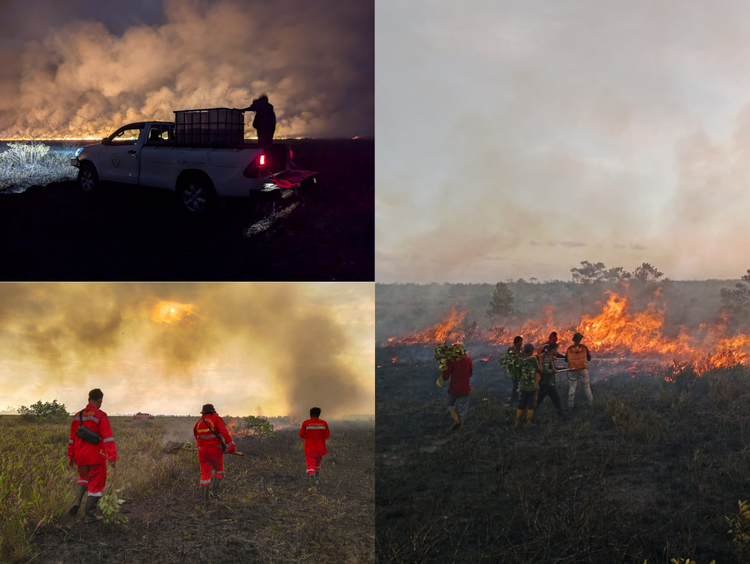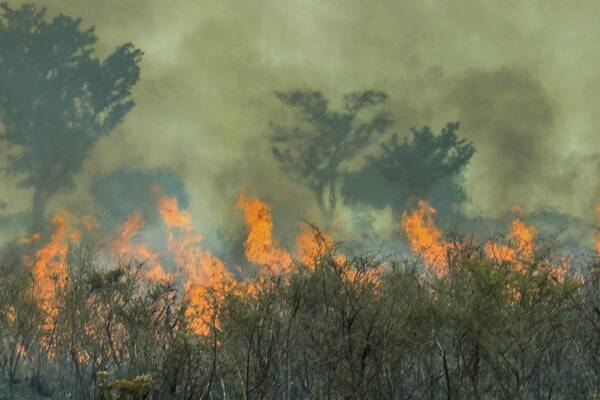
As Indonesia's dry season continues, the risk of forest fires in critical wildlife habitats like the Lamandau Nature Reserve (formerly known as Lamandau Wildlife Reserve) in Borneo significantly increases. These fires pose a severe threat to the already fragile ecosystems, home to endangered species like the orangutan.
This year, monitoring activities by guard posts coordinated by the Orangutan Foundation, have proven crucial in the early detection and rapid response to fires within the reserve. Guard posts are equipped to tackle these fires before they can cause irreversible damage.
Number and Location of Guard Posts
There are typically five main guard posts strategically located throughout the Lamandau Nature Reserve. These posts are positioned at key entry points and along crucial areas within the reserve to monitor and control access, prevent illegal activities, and respond to emergencies such as forest fires.
How the Guard Posts Operate
Monitoring and Surveillance: The guard posts are staffed by rangers who conduct regular patrols in the surrounding areas. They monitor for signs of illegal activities such as logging, hunting, or land encroachment. This constant presence helps deter illegal activities and allows for quick action when violations are detected.
Fire Prevention and Response: During the dry season, the risk of forest fires increases significantly. The guard posts are equipped with firefighting equipment, much of which has been funded by supporters (including us!). Rangers at the guard posts are trained to quickly respond to fires, working in coordination with local fire-fighting teams, such as those from BKSDA (the Natural Resources Conservation Agency), to contain and extinguish fires before they spread.
Wildlife Protection: The rangers also play a crucial role in protecting the wildlife within the reserve, particularly the orangutans. They monitor the orangutan populations, ensuring that these animals are safe from poachers and that their habitats are preserved. The guard posts also assist in the rehabilitation and release of orangutans that have been rescued from captivity or conflict situations.
Community Engagement and Education: The guard posts serve as points of contact between the reserve management and local communities. Rangers often engage with nearby villagers to raise awareness about the importance of conservation and to involve them in protecting the reserve. This includes educating communities on the dangers of forest fires and the benefits of preserving the natural environment.
2024 Forest Fires
Recently, an Orangutan Foundation guard post reported a fire rapidly spreading through the rainforest, exacerbated by strong winds and the dry, flammable vegetation typical of Borneo's dry season. The fire had the potential to devastate large swathes of the forest, but thanks to the swift action of the guard post and the dedicated fire-fighting teams from BKSDA, the fire was contained and extinguished within 24 hours.
About Lamandau Nature Reserve
Lamandau Nature Reserve, located in Central Kalimantan, Indonesia, is a critical sanctuary for the conservation of Bornean orangutans, a species currently classified as critically endangered. Spanning over 76,000 hectares, the reserve provides a safe haven for orangutans that have been rescued or rehabilitated, as well as those living in the wild. The area is rich in biodiversity, with dense rainforests, rivers, and swamps that support a variety of wildlife species. The Orangutan Foundation, which manages conservation efforts in the reserve, plays a crucial role in protecting this habitat from threats like illegal logging, land conversion, and forest fires. The ongoing work in Lamandau is vital for the long-term survival of the orangutans and the preservation of their natural environment.
Indonesia's Dry Season
Indonesia's dry season typically occurs from May to October. The timing and intensity of the dry season can vary slightly depending on the region, with some areas experiencing a more pronounced dry season than others. The dry season is characterized by lower rainfall, higher temperatures, and increased risk of wildfires, especially in forested regions like Borneo and Sumatra. The onset and end of the dry season can also be influenced by climate patterns such as El Niño, which can extend the duration and severity of dry conditions.
Images: Orangutan Foundation




